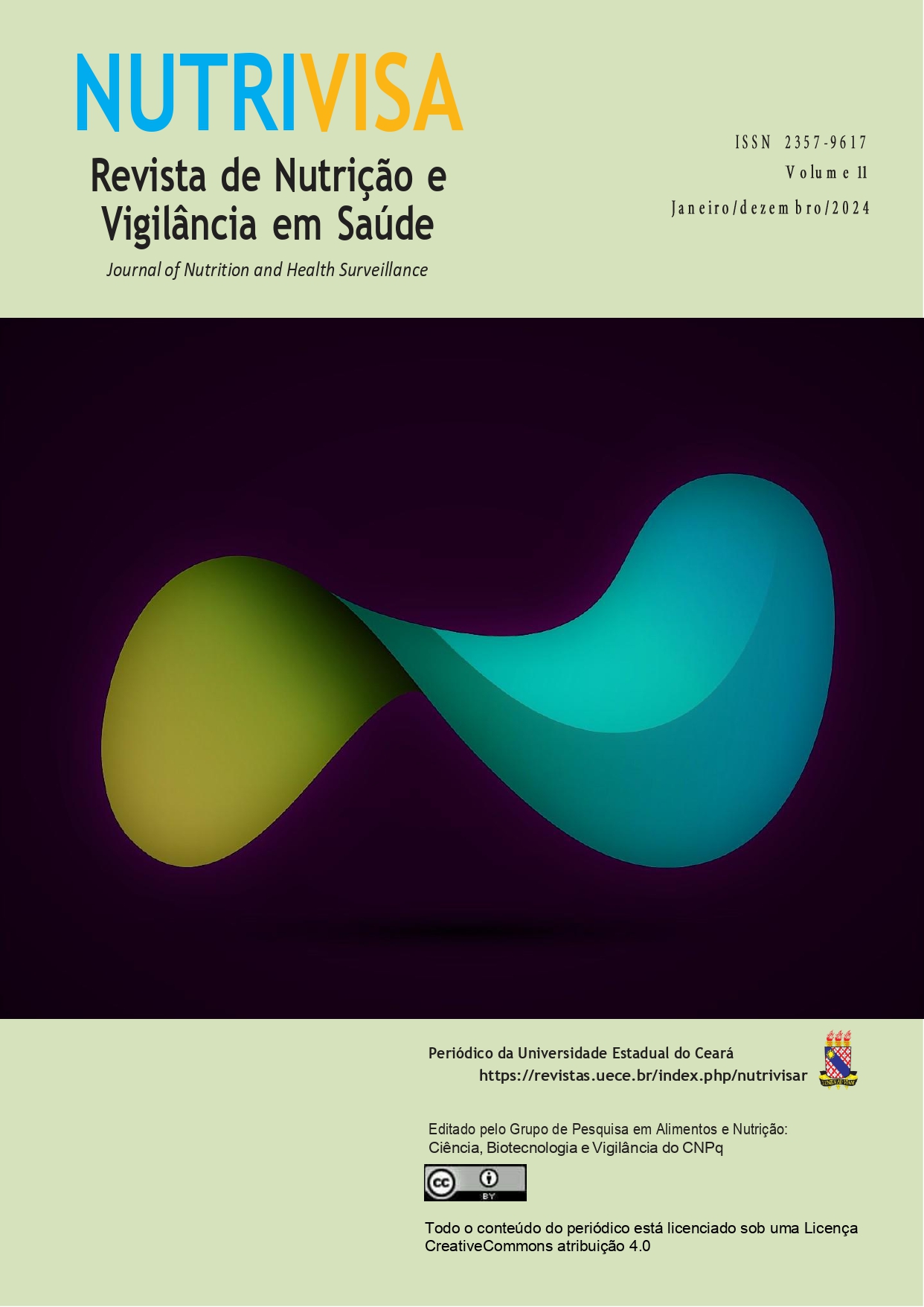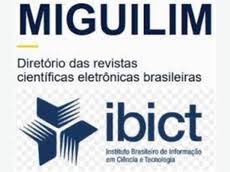Efeitos da COVID longa e sua relação com a nutrição: uma revisão integrativa
DOI:
https://doi.org/10.59171/nutrivisa-2024v11e13236Palavras-chave:
SARS-COV-2; alimentação; deficiências nutricionais; nutrientes.Resumo
A recuperação da Covid-19 representa um desafio aos cuidados em saúde uma vez que tem diferentes tipos de sequelas que trazem sintomas e desconfortos aos pacientes a longo prazo e os tratamentos ainda são limitados. O estado nutricional dos indivíduos afetados sofre grande influência dessas alterações que comprometem as reservas de massa muscular e atrasa a recuperação. O objetivo desse estudo foi buscar evidências científicas sobre os possíveis sintomas da Covid -19 longa e sua relação com as deficiências e o tratamento nutricional. Esse trabalho é uma revisão de literatura integrativa associando-se descritores de Covid e Nutrição. A busca dos estudos foi realizada na base de dados Science direct e resultou em 14620 artigos. Destes, foram incluídos 11 artigos originais que evidenciaram em muitos pontos uma associação de risco nutricional com piora dos sintomas de Covid. Os estudos sugerem que muitas deficiências nutricionais, inclusive de energia e proteína, estão presentes em pacientes em quadro clínico de Covid. Entre os nutrientes mais citados a vitamina D, o zinco e o ácido ascórbico estão deficientes na maioria dos casos. A maioria dos estudos sugerem deficiências nutricionais como sendo prejudiciais nos casos de Covid, mas poucos trouxeram evidências de tratamento utilizando nutrientes específicos. As intervenções nutricionais propostas estão relacionadas a melhoria dos sintomas e correção das deficiências como forma de otimizar a recuperação do paciente. Os achados ainda são precoces dado o pouco tempo de pesquisas envolvendo Covid e alimentação, mas sugerem relação importante para garantia de melhores prognósticos.
Referências
AL-ZADJALI, J. AL-LAWATI A, AL RIYAMI N, AL FARSI K, AL JARRADI N, BOUDAKA A, AL BARHOUMI A, AL LAWATI M, AL KHAIFI A, MUSLEH A, GEBRAYEL P, VAULONT S, PEYSSONNAUX C, EDEAS M, SALEH J. Reduced HDL-cholesterol in long COVID-19: A key metabolic risk factor tied to disease severity. Clinics (Sao Paulo, Brazil), v. 79, p. 100344, 2024.
AUSÍN-GARCÍA, C; CERVILLA-MUNOZ, E; MILLAN-NUNEZ-CORTÉS, J. Long-term consequences of SARS-COV2 infection: Long-Covid patterns and possible public health implications. Medicina Clínica. v.157, n.7, p.e293-e294, 2021.
BARROSO, E; TUTA-QUINTERO, E; OLIVELLA, J; ARAGÓN, C; VÁSQUES, L; ACOSTA, L; PINZÓN, O; PANTOJA, C.A; COLLLAZOS, E; ASCANIO, P.Y; MORALES, V.C.D.R; KUAN, J.C; VELASQUEZ, L.A; DÍAZ, Y.N; PIMENTEL, J. Guillain Barré syndrome in the paediatric population. Consequence of active infection or long Covid? Revista Colombiana de Reumatología.v.29, n.4, p. 335-346. 2022.
BRASIL, Diretrizes e Normas Regulamentadoras de Pesquisas Envolvendo Seres Humanos. Resolução 466/12 – CNS, 2012.
BRASIL. Orientações para a coleta e análise de dados antropométricos em serviços de saúde: Norma Técnica do Sistema de Vigilância Alimentar e Nutricional – SISVAN. Ministério da Saúde, Secretaria de Atenção à Saúde, Departamento de Atenção Básica. – Brasília: Ministério da Saúde, 2011.
CASH, A.; KAUFMAN, D. L. Oxaloacetate Treatment For Mental And Physical Fatigue In Myalgic Encephalomyelitis/Chronic Fatigue Syndrome (ME/CFS) and Long-COVID fatigue patients: a non-randomized controlled clinical trial. Journal of translational medicine, v. 20, n. 1, p. 295, 2022.
CHEN, K.-Y.; LIN, C.-K.; CHEN, N.-H. Effects of vitamin D and zinc deficiency in acute and long COVID syndrome. Journal of trace elements in medicine and biology: organ of the Society for Minerals and Trace Elements (GMS), v. 80, n. 127278, p. 127278, 2023.
DAVIS, H. E; MCCORKELL, L., VOGEL, J.M. ERIC J. TOPOL. Long COVID: major findings, mechanisms and recommendations. Nature reviews. Microbiology, v. 21, n. 3, p. 133–146, 2023.
DEER, R. R; HOSEIN E, HARVEY M, NGUYEN T, GIVAN A, HAMILTON M, TURNER K, KRETZMER R, ROCK M, SWARTZ MC, SEASHORE J, BROWN B, MESSENGER C. Impact of COVID-19 infection and persistent lingering symptoms on patient reported indicators of nutritional risk and malnutrition. Nutrients, v. 14, n. 3, 2022.
D’ETTORRE, G.; GENTILINI CACCIOLA E, SANTINELLI L, DE GIROLAMO G, SPAGNOLELLO O, RUSSO A, TARSITANI L, CICCOZZI M, MASTROIANNI CM, D'ETTORRE G, CECCARELLI G.Covid-19 sequelae in working age patients: A systematic review. Journal of Medical Virology. v.94, n.3, p.858-868, 2022.
GALLUZZO, V. ZAZZARA MB, CICIARELLO F, SAVERA G, PAIS C, CALVANI R, PICCA A, MARZETTI E, LANDI F, TOSATO M; Gemelli Against COVID-19 Post-Acute Care Team. Fatigue in Covid-19 survivors: The potential impact of a nutritional supplement on muscle strength and function. Clinical nutrition ESPEN, v. 51, p. 215–221, 2022.
GÉRARD, M. MAHMUTOVIC, M.; MALGRAS, A.; MICHOT, N.; SCHEYER, N.; JAUSSAUD, R.; NGUYEN-THI, P.-L.; QUILLIOT, D. Long-term evolution of malnutrition and loss of muscle strength after COVID-19: A major and neglected component of long COVID-19. Nutrients, v. 13, n. 11, p. 3964, 2021.
HANDU, D. MOLONEY L, ROZGA M, CHENG FW. Malnutrition care during the COVID-19 pandemic: Considerations for registered dietitian nutritionists. Journal of the Academy of Nutrition and Dietetics, v. 121, n. 5, p. 979–987, 2021.
JINSONG ZHANG, RAMY SAAD, ETHAN WILL TAYLOR, MARGARET P. RAYMAN. Selenium and selenoproteins in viral infection with potential relevance to COVID-19. Redox Biology,v. 37,p.101715, 2020.
LITZ, B. T. CUMMINGS MH, GRUNTHAL B, MCLEAN CL. A public health framework for preventing mental disorders in the context of pandemics. Cognitive and behavioral practice, v. 28, n. 4, p. 519–531, 2021.
LIU, T.-H. HO CH, CHEN DT, WU JY, HUANG PY, LAI CC, HSIEH KY, SU KP. Omega-3 polyunsaturated fatty acids and the psychiatric post-acute sequelae of COVID-19: A one-year retrospective cohort analysis of 33,908 patients. Brain, behavior, and immunity, v. 114, p. 453–461, 2023.
MONTES-IBARRA, M.; OLIVEIRA CLP, ORSSO CE, LANDI F, MARZETTI E, PRADO CM.The impact of long COVID-19 on muscle health. Clinics in Geriatric Medicine. v.38, n.3, p.545-557, 2022.
MOHAMMADI, A.H.; BEHJATI M, KARAMI M, ABARI AH, SOBHANI-NASAB A, ROURANI HA, HAZRATI E, MIRGHAZANFARI SM, HADI V, HADI S, MILAJERDI A. An overview on role of nutrition on COVID-19 immunity: Accumulative review from available studies. Clinical Nutrition Open Science. v.47, p.6-43, 2023.
ORMSBEE, M. J. PRADO CM, ILICH JZ, PURCELL S, SIERVO M, FOLSOM A, PANTON L. Osteosarcopenic obesity: the role of bone, muscle, and fat on health. Journal of cachexia, sarcopenia and muscle, v. 5, n. 3, p. 183–192, 2014.
PEDROSA, L.FC., ACSA N.A.B. BARROS, LUCIA LEITE-LAIS. Nutritional risk of vitamin D, vitamin C, zinc, and selenium deficiency on risk and clinical outcomes of COVID-19: A narrative review. Clinical Nutrition ESPEN,v. 47,p. 9-27, 2022.
PIOTROWICZ, K.; GASOWSKI, J.P; MICHEL JP; VERONESE N. Post-COVID-19 acute sarcopenia: physiopathology and management. Aging Clinical and Experimental Research. v.33, n.10, p.2887-2898, 2021.
RATHI A, JADHAV SB, SHAH N. A Randomized Controlled Trial of the Efficacy of Systemic Enzymes and Probiotics in the Resolution of Post-COVID Fatigue. Medicines. v.8, n.9, p.47, 2021.
RONQUILLO, W. A; GATCHALIAN-YEE, MARITES; MOPERA, LOTIS; BARRION, AIMEE. Development of Saba (Musa “BBB” acuminata x balbisiana) Peel-Monggo [Vigna radiata (L.) R. Wilczek] Flours with Malunggay (Moringa oleifera Lam.) Polvoron Bar. Food and nutrition sciences, v. 11, n. 04, p. 262–280, 2020.
SAMPAIO, L.R., org. Avaliação nutricional. Salvador: EDUFBA, p. 23-47, 2012.
SLANKAMENAC, J; RANISAVLJEV M, TODOROVIC N, OSTOJIC J, STAJER V, CANDOW DG, RATGEBER L, BETLEHEM J, ACS P, OSTOJIC SM. Eight-week creatine-glucose supplementation alleviates clinical features of long COVID. Journal of nutritional science and vitaminology, v. 70, n. 2, p. 174–178, 2024.
TOSATO M, CICIARELLO F, ZAZZARA MB, PAIS C, SAVERA G, PICCA A, GALLUZZO V, COELHO-JÚNIOR HJ, CALVANI R, MARZETTI E, LANDI F; Gemelli Against COVID-19 Post-Acute Care Team. Nutraceuticals and Dietary Supplements for Older Adults with Long COVID-19. Clinics in Geriatric Medicine. v.38, n.3, p.565-591, 2022.
WANG, C.; ZHAO, H. The impact of covid-19 on anxiety in Chinese university students. Frontiers in Psychology.v.11, 2020.
WANG Y, WU G, ZHAO L, WANG W. Nutritional Modulation of Gut Microbiota Alleviates Severe Gastrointestinal Symptoms in a Patient with Post-Acute COVID-19 Syndrome. mBio. V.13, n.2, p.e0380121, 2022.
WORLD HEALTH ORGANIZATION. A clinical case definition of post COVID-19 condition by a Delphi consensus, 6 October 2021.
WU, K; VAN NAME,J; XI, L. Cardiovascular abnormalities of long-COVID syndrome: Pathogenic basis and potential strategy for treatment and rehabilitation. Sports Medicine and Health Science, 2024.
THOMAS S, PATEL D, BITTEL B; WOLSKI K, WANG Q, KUMAR A, IL'GIOVINE ZJ, MEHRA R, MCWILLIAMS C, NISSEN SE, DESAI MY. Effect of High-Dose Zinc and Ascorbic Acid Supplementation vs Usual Care on Symptom Length and Reduction Among Ambulatory Patients With SARS-CoV-2 Infection: The COVID A to Z Randomized Clinical Trial. JAMA Netw Open. v.4, n.2, p.e210369, 2021.
TOWNSEND L, DYER AH, MCCLUSKEY P, O'BRIEN K, DOWDS J, LAIRD E, BANNAN C, BOURKE NM, NÍ CHEALLAIGH C, BYRNE DG, KENNY RA. Investigating the Relationship between Vitamin D and Persistent Symptoms Following SARS-CoV-2 Infection. Nutrients. V.13, n.7, p.2430, 2021.
VOLLBRACHT, C.; KRAFT, K. Feasibility of Vitamin C in the Treatment of Post Viral Fatigue with Focus on Long COVID, Based on a Systematic Review of IV Vitamin C on Fatigue. Nutrients. v.13, p.1154, 2021.
Downloads
Publicado
Como Citar
Edição
Seção
Licença
Copyright (c) 2024 Sthefany Lopes Honorato, Alexandre Lucas Lima França Cabral, Celso Lourenco de Arruda Neto, Sandra Machado Lira

Este trabalho está licenciado sob uma licença Creative Commons Attribution 4.0 International License.














